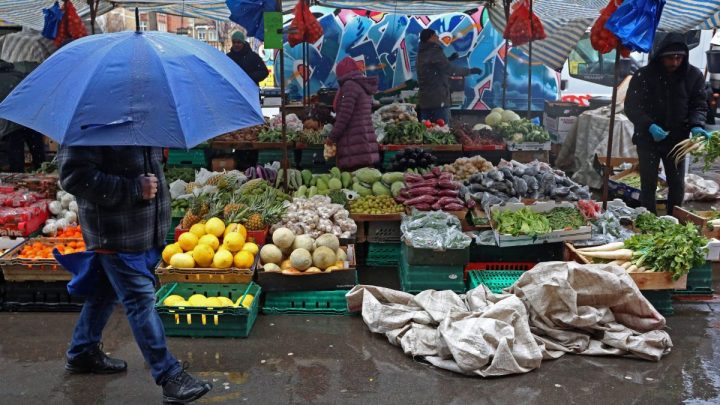
Inflation: Why is it so sticky in the UK?

The inflation that has ripped through the developed world — pushing up energy and commodity prices — is international in origin, stemming from the COVID-19 pandemic and the war in Ukraine. But not every country has been equally affected.
While the latest headline inflation rate in the United States was 4% year over year, it has clocked in at a significantly higher 8.7% in the United Kingdom.
Inflation has been falling generally, but it is not falling as fast in the U.K. as the country’s central bank, the Bank of England, had been expecting. In the jargon, U.K. inflation is proving “sticky.”
“I worry that inflation is becoming embedded here,” Sushil Wadhwani, a former member of the BOE committee that sets interest rates, told the BBC in a recent interview. “People are expecting inflation to stay high for longer. And that obviously is a dangerous development.“
It’s dangerous because businesses that believe inflation will persist often raise their prices, adding to the problem.
One of the key factors pushing up prices in the U.K. is a labor shortage. There are fewer European Union workers available post-Brexit, and many British workers of prime age have taken early retirement or are off sick because preexisting ailments went untreated by the overburdened, state-run national health care system during the pandemic.
The U.K. has apparently been hit harder by this labor shortage than many comparable economies.
“The U.K. labor force is still below its pre-pandemic level, while in the U.S. the labor force is above its pre-pandemic level,” said Ashley Webb of the Capital Economics consulting firm. The higher demand for labor has put upward pressure on wages.
“Wage growth is still much higher in the U.K. than it is in the U.S., and that’s contributing to higher inflation,” Webb pointed out.
This is how the classic wage-price spiral unfolds: Businesses pass on their high labor costs to their customers. The prices of goods and services rise as a result, then workers demand big pay hikes to keep up with the soaring cost of essentials. Food price inflation in the U.K. has hit a 45-year peak.
“The annual rate of food inflation in the U.K. was 19% in April,“ said Paula Bejarano Carbo of the National Institute of Economic and Social Research. “That compares with 7.7% in April in the U.S.”
Some economists blame the U.K.’s soaring prices largely on Brexit. But Bejarano Carbo insisted that many different factors were involved. For example, you could hardly claim that the rocketing price of food is due to the U.K.’s departure from the European Union when many European countries are suffering too.
“The EU also saw an increase of above 19% in food price inflation in April,” she pointed out.
The U.K.’s overall inflation rate — at 8.7% — is around half a percentage point higher than for the EU and more than 1.5 percentage points higher than for the countries that use the euro, including France and Germany.
One reason for that disparity, Webb said, is that some EU governments capped energy prices, a major factor in inflation, sooner and by more than the UK did.
“France, for instance, intervened quicker and more assertively, and that meant basically the energy price component of inflation didn’t rise as far as in the U.K.,” he said.
The eurozone’s more rapidly decelerating rate of inflation might also be attributed to the fact that, unlike the U.K., the currency bloc slid into recession during the winter.
Patrick Minford, a professor at Cardiff Business School, isn’t worried at all about the U.K.’s current bout of inflation. He believes economic trends are moving in the right direction for the country.
“The commodity price shocks are being reversed, and that’s coming down the pipeline. Also, monetary policy has been tightened enormously. Fundamentally, I think the U.K. is a good economy,” Minford said.
But inflation rates do matter — workers demand pay hikes on the back of them. And the fact that the Organization for Economic Cooperation and Development is forecasting that this year, the U.K. will have the highest inflation rate in the G20, apart from Argentina and Turkey, doesn’t exactly foster economic confidence.
There’s a lot happening in the world. Through it all, Marketplace is here for you.
You rely on Marketplace to break down the world’s events and tell you how it affects you in a fact-based, approachable way. We rely on your financial support to keep making that possible.
Your donation today powers the independent journalism that you rely on. For just $5/month, you can help sustain Marketplace so we can keep reporting on the things that matter to you.

















